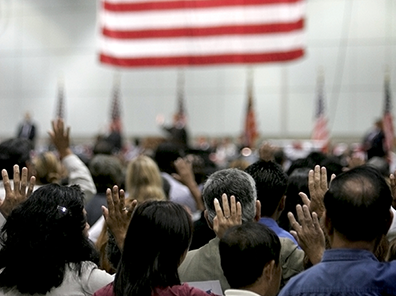
One of the immigration debate's most interesting sidebar issues involves terminology. It is now unthinkable for any public figure, news outlet, or reputable citizen to use the term "wetbacks" to describe people in the country illegally. But in the 1950s, the New York Times routinely used the term. In 1951, President Harry Truman's Commission on Migratory Labor reported: "That the wetback traffic has severely depressed farm wages is unquestionable."
"Wetbacks" is a literal translation of the term espaldas mojadas which was widely used south of the border. It is colorful and irreverent, like many terms in the Spanish that is spoken in Mexico. It is still occasionally used, without malice, in the borderlands. But today, and for good reason, it is unacceptable in polite discussion because it is regarded as a slur and a provocation.
Lately, the mother of all terminology battles has been fought over descriptions of the millions of persons who are in the United States illegally. Should they be described as "illegal immigrants"? "Undocumented workers"? "Unauthorized immigrants"? Some say the appropriate term is "illegal aliens", arguing that we tilt the discussion when we identify those who have evaded the law as "immigrants" because an immigrant, under the law, is someone who has been admitted for residence in the United States.
Both sides understand that the terms of the debate are a matter of linguistic framing. By influencing public attitudes, they can shape policy outcomes.
What most concerns me is the effort to blur the line between legal and illegal immigration. It has gained momentum as many Democrats and other liberals have categorically rejected any policy that President Trump has adopted regarding the enforcement of immigration laws. Oakland Mayor Libby Schaaf gave forceful expression to this sentiment when she said, "We in Oakland have a community that welcomes and honors all people, no matter where they came from — no matter how they got here.''
The latest item involving language and framing that has caught my eye appears in an article about California senator and presidential candidate Kamala Harris. Published in the May issue of The Atlantic, it is titled "Kamala Harris Takes Her Shot".
What jumped out at me was writer Elizabeth Weil's summary of Harris's platform. She wrote that the platform included "a path to citizenship for immigrants". Weil did not see fit to mention that she was referring to a proposal to benefit those who have violated immigration law. By not reporting that salient fact, Weil did the work of the immigration activists who have long sought to blur the line between legal and illegal immigration. They believe that it is a human right to immigrate to the United States or other countries. They provide the most unequivocal and direct definition of "open borders policy".
There are many such activists in the Democratic base. They are practitioners of ideological purity regarding immigration and other issues. If they succeed in winning the Democratic presidential nomination for one of their own, they will be giving Donald Trump his best chance to win a second term.
I don't know of any immigration restrictionist who wants to deny a path to citizenship for lawful immigrants. Indeed, we want those who receive a green card to exercise their right to naturalize. We want them to become part of our national family, to embrace their identity as American citizens, to invest in becoming part of the American body politic.
But immigration activists like Mayor Schaaf have gone too far. They have sacralized the values of inclusion, diversity, and equality. They take offense at those who would dare to exclude anyone who crosses our borders, no matter how they got here. They exemplify what social psychologist Jonathan Haidt says is commonplace among tribal groups: that their fervent adherence to sacred values both binds them together and blinds them to alternative views.
Now these activists seem to be blind to the fact that if they have their way in the Democratic primaries, many Americans who would rather not vote for Trump will feel that they have no alternative.
